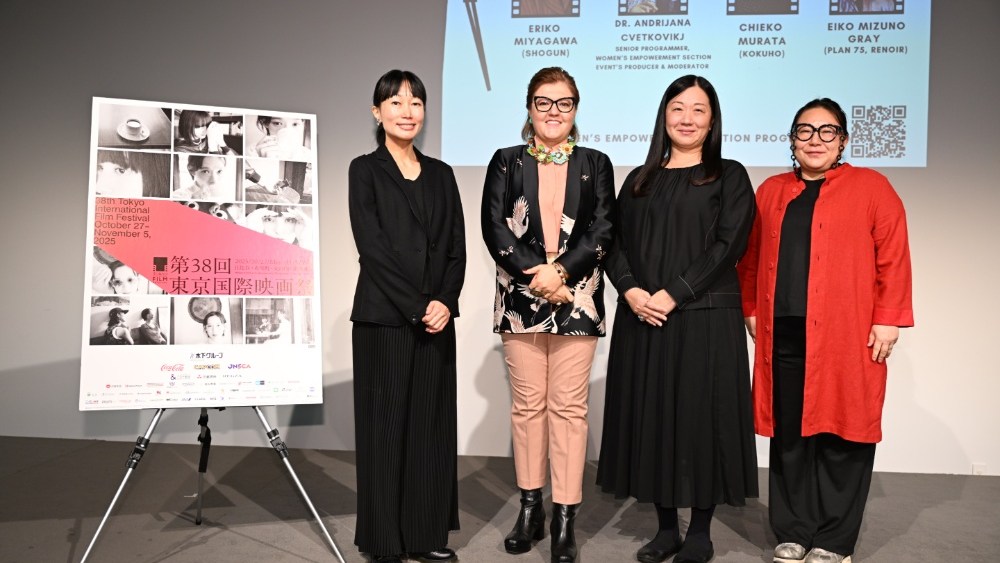Three Japanese female producers who have achieved international critical and commercial success, Etsuko Miyagawa, Eiko Gray Mizuno, and Chieko Murata, participated in an event in the Women’s Empowerment section of the Tokyo International Film Festival. Moderated by section curator Andrijana Cvetković, the trio began by tracing their path to their current profession.
Miyagawa, who co-won an Emmy Award for her work on the hit streaming series “Shogun,” said she started out as an interpreter on the set of Quentin Tarantino’s “Kill Bill Vol. 1,” and said, “I couldn’t believe how much work went into creating each shot and the chaos of it.” “I fell in love with the process.”
She added that working with Tarantino was “both a gift and a curse because he’s a genius.” “Maybe I could have been a director, but working for him I knew I could never do that,” she explained. “But I love promoting things, I want to be a part of everything, I want to know everything, so producing felt like a natural fit.”
Mizuno Gray started out as a volunteer at the Toronto Film Festival and later became involved in promotional activities. She then became interested in producing, and “I thought if I could see the entire filmmaking process from beginning to end, I should give it a try,” she said.
She and her husband Jason Gray founded a company called Loaded Films and began producing films. Credits include an award-winning collaboration with Chie Hayakawa, director of Plan 75, which was nominated for the 2022 Cannes Golden Camera, and Renoir, which was submitted to the 2025 Cannes Competition.
Mr. Murata studied directing, acting, and cinematography at a film school in the United States, and recalled realizing that “I was bad at all of them.” “So the job that was left for me was to produce,” she added.
Upon returning to Japan, she found work as an assistant to an executive producer and began climbing the corporate ladder. After previously serving as local production director for Fox International Production and senior vice president of Japan and Southeast Asia production for Sony Pictures Entertainment, he was appointed senior vice president of Aniplex, producer of the hit anime series Demon Slayer: Kimetsu no Yaiba, in 2020. She was also the producer of this year’s live-action sensation “Kokuho.”
When asked what valuable assets a person has as a producer, Miyagawa points to “listening and flexibility,” adding, “I think empathy goes a long way,” adding, “Put yourself in the other person’s shoes and try to understand where their priorities come from. Also, be clear about what your goals are and what kind of story you want to tell.”
When asked about his role in the record-breaking success of the Lee Sang-il drama “Kukbo,” set in the world of kabuki, Murata modestly answered that he couldn’t take credit for it. “It all depends on the director, the crew, the writers and the amazing actors,” she said. “But my experience was very helpful when meeting with international film festival programmers and international filmmakers and producers. They gave me a lot of input.”
What they told her was that she was missing out on the great masterpieces of Ozu, Kurosawa, and other giants of the golden age of Japanese cinema. “They asked why there are no such films in Japan today,” she said. “And my answer was OK, let’s make an epic studio movie like that.” That is, “National Treasure,” with lavish sets and costumes, a story that spans decades, and a running time of three hours.
In contrast to Murata’s corporate trajectory, Mizuno Gray has always been an independent producer, having to choose projects himself rather than being assigned them. “You have to be very selective,” she said. And for her, a key part of the selection process is “understanding the creator’s vision, reasoning, and storytelling.”
“So, first of all, I would like to try to get to know the filmmakers not only about their creative abilities, but also about them as human beings,” she added. “And if our visions align, I will try to make that happen as a producer.”
For Miyagawa, packaging is “very important.” That doesn’t just mean the director, screenwriter, and cast, but also the story. “It’s really a balance of all of those things,” she explains.
Murata said that what makes him different from the other two producers is, “I’m a Japanese company employee, so I make movies and TV shows that make money for the company.”
Kokuhou, which has grossed $109 million since its release in June and is the third-highest grossing Japanese live-action film of all time, clearly checks that particular box. “Talent is also very important,” Murata added. “Because this business is all about bringing money to talent.”

